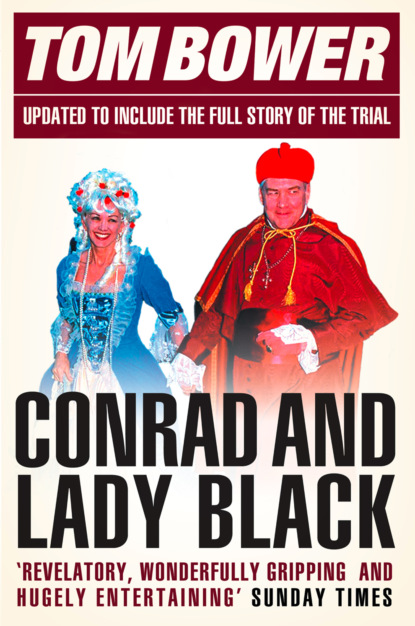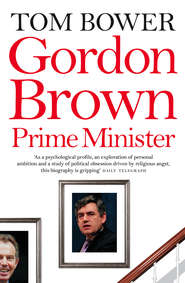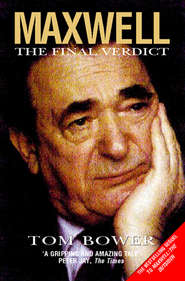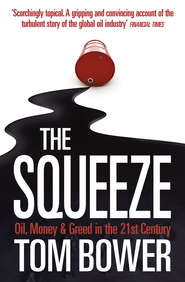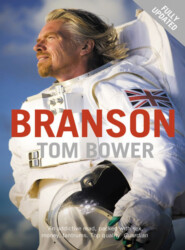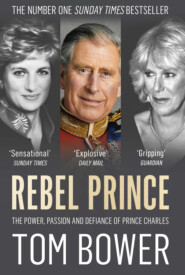По всем вопросам обращайтесь на: info@litportal.ru
(©) 2003-2024.
✖
Conrad and Lady Black: Dancing on the Edge
Настройки чтения
Размер шрифта
Высота строк
Поля
Conrad and Lady Black: Dancing on the Edge
Tom Bower
The riveting tale of how the wanabee aristo Conrad Black and his social-mountaineering wife Barbara gulled their way into the City, the Tory party, Wall Street and High Society. This new paperback edition will be fully updated to include details of Black’s high-profile trial for corporate fraud, sure to claim international attention.The rise and fall of the media tycoon Conrad Black is rivalled in its spectacular extravagance only by the machinations of his social-mountaineering wife, Barbara Amiel. Together their story of overweening ambition and greed is a modern-day classic of hubris.There is no bolder or better-informed chronicler of the follies of the rich and powerful than Tom Bower. Fearless in the approach which has brought him accolades for his gripping exposés of Robert Maxwell, Tiny Rowland, Mohammed Fayed and Richard Branson, Bower reveals how the Blacks financed a billionaire’s lifestyle and won friends and influence in London and New York.Born into considerable wealth in Canada, Conrad Black bought and sold (but never effectively managed) several businesses, from mining and tractors to broadcasting companies and newspapers. In 1985 he bought the Telegraph group in London, where very little was known of the controversy over his past financial dealings.In 1992 he married Barbara Amiel, who later famously said, ‘I have an extravagance that knows no bounds’. Besotted with his wife, he began living way beyond his means. Fabulous parties, jewellery, clothes, private jets and homes followed. In 2003 an independent report in America accused him of ‘outright fraud’, ‘ethical corruption’ and ‘corporate kleptocracy’ – allegations that he will vigorously deny at his trial in Chicago in 2007. This edition will be updated to include the full story of the trial in all its sensational detail.Tom Bower’s book, based on over 150 interviews with bankers, politicians, celebrities, power-brokers and close friends, is packed with intimate revelations. It is a hugely entertaining account of gullibility in high places.
Conrad and Lady Black
Dancing on the Edge
Tom Bower
DEDICATION (#ulink_e5fd7f8b-2260-55ce-a6d5-e5b7f3ccb959)
For Ruth
CONTENTS
Cover (#uce9aab6b-dff0-5373-8c02-f56ee15d4f0c)
Title Page (#ue94fff1e-0e14-51db-999f-d153ada6c955)
Dedication (#u9a9d8cb8-9349-550f-9f19-d38634f036eb)
Preface (#u8f9a0463-13cc-5e5c-99b9-60f87e49287c)
Introduction: The Wedding, 26 January 1985 (#u2c511486-5ee5-527d-961d-da7c8ceacd70)
1 A Timely Death (#ub4c837d1-dfdc-59ea-9b20-7e6926e194c2)
2 The Stain (#u442ebb1c-b51e-5519-90fa-502819ef97f4)
3 The Survivor (#ucc35d46d-fda7-5d85-b0ed-8ff0bd127801)
4 Salvation (#ub093fd20-beb4-5dfc-bcb4-595632247f11)
5 The Visit (#uc047f892-3a2b-54ca-a931-61104e8a95aa)
6 Inevitable Union (#litres_trial_promo)
7 Demons (#litres_trial_promo)
8 Bliss (#litres_trial_promo)
9 The Torpedo (#litres_trial_promo)
10 The A-List (#litres_trial_promo)
11 Sliding Towards the Edge (#litres_trial_promo)
12 ‘Thief!’ (#litres_trial_promo)
13 The Purist (#litres_trial_promo)
14 Resurrection (#litres_trial_promo)
15 The Trial (#litres_trial_promo)
Index (#litres_trial_promo)
Acknowledgements (#litres_trial_promo)
About the Author (#litres_trial_promo)
Notes (#litres_trial_promo)
Praise (#litres_trial_promo)
Other Works (#litres_trial_promo)
Copyright (#litres_trial_promo)
About the Publisher (#litres_trial_promo)
PREFACE (#ulink_f38d3d95-2702-5756-b469-f8fbf2d37b3c)
Conrad Black’s email arrived at 1.15 a.m. on 1 April 2006, April Fool’s Day in London. Black, whom I had known since the mid-1980s, was well aware of this book’s progress, and said he had been contacted by many of his and his wife’s acquaintances, seeking his advice as to whether they should talk to me. His response was nothing if not graphic:
Dear Tom,
Many people have contacted Barbara and me asking if they should talk with you. Our usual response is that you have made it clear that you consider this whole matter a heart-warming story of two sleazy, spivvy, contemptible people, who enjoyed a fraudulent and unjust elevation; were exposed, and ground to powder in a just system, have been ostracised; and largely impoverished, and that I am on my way to the prison cell where I belong. It is the false rise and well-deserved downfall of crooked charlatans; a variant on your treatments of Maxwell, Fayed, and Rowland. You have expressed essentially this view many times that have been reported to me.
He asked me to prove that I was not writing ‘a pompous, defamatory celebration of the supposed demise of people you personally dislike’. In justification of his indignation, and keen that I should understand his innocence, he continued:
The rough facts are that I am an honest businessman; the chances of my committing an illegality are less than zero, this will be clear when my accusers have to prove beyond a reasonable doubt the guilt of innocent people and not just manipulate the agencies of the US and Canadian governments to act on the pre-emptive presumption of guilt and conduct a prolonged assassination of careers and reputations.
Conrad Black believes that he is the victim of political and personal prejudice. He has damned those seeking ‘a big scalp (mine)’, and believes his persecutors first sought his social ostracism and bankruptcy, and later destroyed his ‘fine company’. Under his ownership, he commented with some reason in his second email during the night, the two Telegraph newspapers in London were better ‘compared to what preceded and followed us’. In his opinion, the only victims of his personal and corporate downfall were the creators of a successful enterprise. Other than himself, he argued, no one lost money – shareholders, traders or pensioners. His critics and his American prosecutor contest that claim.
Convinced of his acquittal, Black pledged himself to ‘turn the tables on our oppressors’. He would wreak vengeance upon those responsible for his demise: ‘We will bring this entire, gigantic, malicious persecution down around the ears of its authors.’ He was, he wrote later that night, proud of his robustness. Three years after the news of his predicament emerged, and one year before his trial, he observed that no one could deny that ‘despite my wildly applauded setback I am completely undaunted, and that I am not a tight-lipped source of “no comment”’. Indeed, his high-profile appearances around Toronto had become the stuff of gossip.
In another email during that night, Conrad Black keenly anticipated the stardom that he would achieve at his trial, which was due to start in Chicago in March 2007:
My trial will be timely; Thermidor will have dawned, and legally responsible capitalism will survive, like Talleyrand and Fouché.
He concluded:
I promise a spectacular trial …
Regards, CONRAD BLACK.
Conrad Black’s life story is not the familiar tale of a tycoon’s ‘rise and fall’, or the tragedy of a self-delusional fantasist. Rather, it is the drama of a plutocrat and aristocrat who stands accused as a kleptocrat. He will arrive in Chicago preceded by two damning findings: the first by a court in Delaware, the second by a special committee of investigators appointed with his approval. The investigators’ withering 513-page condemnation of Black’s business methods would have destroyed most men, and his vigorous protestations of innocence have won him some sympathy. The riddle is just how he has found himself in this position. In the search for an answer it is important to understand his marriage to Barbara Amiel, and her own behaviour.
Tom Bower
The riveting tale of how the wanabee aristo Conrad Black and his social-mountaineering wife Barbara gulled their way into the City, the Tory party, Wall Street and High Society. This new paperback edition will be fully updated to include details of Black’s high-profile trial for corporate fraud, sure to claim international attention.The rise and fall of the media tycoon Conrad Black is rivalled in its spectacular extravagance only by the machinations of his social-mountaineering wife, Barbara Amiel. Together their story of overweening ambition and greed is a modern-day classic of hubris.There is no bolder or better-informed chronicler of the follies of the rich and powerful than Tom Bower. Fearless in the approach which has brought him accolades for his gripping exposés of Robert Maxwell, Tiny Rowland, Mohammed Fayed and Richard Branson, Bower reveals how the Blacks financed a billionaire’s lifestyle and won friends and influence in London and New York.Born into considerable wealth in Canada, Conrad Black bought and sold (but never effectively managed) several businesses, from mining and tractors to broadcasting companies and newspapers. In 1985 he bought the Telegraph group in London, where very little was known of the controversy over his past financial dealings.In 1992 he married Barbara Amiel, who later famously said, ‘I have an extravagance that knows no bounds’. Besotted with his wife, he began living way beyond his means. Fabulous parties, jewellery, clothes, private jets and homes followed. In 2003 an independent report in America accused him of ‘outright fraud’, ‘ethical corruption’ and ‘corporate kleptocracy’ – allegations that he will vigorously deny at his trial in Chicago in 2007. This edition will be updated to include the full story of the trial in all its sensational detail.Tom Bower’s book, based on over 150 interviews with bankers, politicians, celebrities, power-brokers and close friends, is packed with intimate revelations. It is a hugely entertaining account of gullibility in high places.
Conrad and Lady Black
Dancing on the Edge
Tom Bower
DEDICATION (#ulink_e5fd7f8b-2260-55ce-a6d5-e5b7f3ccb959)
For Ruth
CONTENTS
Cover (#uce9aab6b-dff0-5373-8c02-f56ee15d4f0c)
Title Page (#ue94fff1e-0e14-51db-999f-d153ada6c955)
Dedication (#u9a9d8cb8-9349-550f-9f19-d38634f036eb)
Preface (#u8f9a0463-13cc-5e5c-99b9-60f87e49287c)
Introduction: The Wedding, 26 January 1985 (#u2c511486-5ee5-527d-961d-da7c8ceacd70)
1 A Timely Death (#ub4c837d1-dfdc-59ea-9b20-7e6926e194c2)
2 The Stain (#u442ebb1c-b51e-5519-90fa-502819ef97f4)
3 The Survivor (#ucc35d46d-fda7-5d85-b0ed-8ff0bd127801)
4 Salvation (#ub093fd20-beb4-5dfc-bcb4-595632247f11)
5 The Visit (#uc047f892-3a2b-54ca-a931-61104e8a95aa)
6 Inevitable Union (#litres_trial_promo)
7 Demons (#litres_trial_promo)
8 Bliss (#litres_trial_promo)
9 The Torpedo (#litres_trial_promo)
10 The A-List (#litres_trial_promo)
11 Sliding Towards the Edge (#litres_trial_promo)
12 ‘Thief!’ (#litres_trial_promo)
13 The Purist (#litres_trial_promo)
14 Resurrection (#litres_trial_promo)
15 The Trial (#litres_trial_promo)
Index (#litres_trial_promo)
Acknowledgements (#litres_trial_promo)
About the Author (#litres_trial_promo)
Notes (#litres_trial_promo)
Praise (#litres_trial_promo)
Other Works (#litres_trial_promo)
Copyright (#litres_trial_promo)
About the Publisher (#litres_trial_promo)
PREFACE (#ulink_f38d3d95-2702-5756-b469-f8fbf2d37b3c)
Conrad Black’s email arrived at 1.15 a.m. on 1 April 2006, April Fool’s Day in London. Black, whom I had known since the mid-1980s, was well aware of this book’s progress, and said he had been contacted by many of his and his wife’s acquaintances, seeking his advice as to whether they should talk to me. His response was nothing if not graphic:
Dear Tom,
Many people have contacted Barbara and me asking if they should talk with you. Our usual response is that you have made it clear that you consider this whole matter a heart-warming story of two sleazy, spivvy, contemptible people, who enjoyed a fraudulent and unjust elevation; were exposed, and ground to powder in a just system, have been ostracised; and largely impoverished, and that I am on my way to the prison cell where I belong. It is the false rise and well-deserved downfall of crooked charlatans; a variant on your treatments of Maxwell, Fayed, and Rowland. You have expressed essentially this view many times that have been reported to me.
He asked me to prove that I was not writing ‘a pompous, defamatory celebration of the supposed demise of people you personally dislike’. In justification of his indignation, and keen that I should understand his innocence, he continued:
The rough facts are that I am an honest businessman; the chances of my committing an illegality are less than zero, this will be clear when my accusers have to prove beyond a reasonable doubt the guilt of innocent people and not just manipulate the agencies of the US and Canadian governments to act on the pre-emptive presumption of guilt and conduct a prolonged assassination of careers and reputations.
Conrad Black believes that he is the victim of political and personal prejudice. He has damned those seeking ‘a big scalp (mine)’, and believes his persecutors first sought his social ostracism and bankruptcy, and later destroyed his ‘fine company’. Under his ownership, he commented with some reason in his second email during the night, the two Telegraph newspapers in London were better ‘compared to what preceded and followed us’. In his opinion, the only victims of his personal and corporate downfall were the creators of a successful enterprise. Other than himself, he argued, no one lost money – shareholders, traders or pensioners. His critics and his American prosecutor contest that claim.
Convinced of his acquittal, Black pledged himself to ‘turn the tables on our oppressors’. He would wreak vengeance upon those responsible for his demise: ‘We will bring this entire, gigantic, malicious persecution down around the ears of its authors.’ He was, he wrote later that night, proud of his robustness. Three years after the news of his predicament emerged, and one year before his trial, he observed that no one could deny that ‘despite my wildly applauded setback I am completely undaunted, and that I am not a tight-lipped source of “no comment”’. Indeed, his high-profile appearances around Toronto had become the stuff of gossip.
In another email during that night, Conrad Black keenly anticipated the stardom that he would achieve at his trial, which was due to start in Chicago in March 2007:
My trial will be timely; Thermidor will have dawned, and legally responsible capitalism will survive, like Talleyrand and Fouché.
He concluded:
I promise a spectacular trial …
Regards, CONRAD BLACK.
Conrad Black’s life story is not the familiar tale of a tycoon’s ‘rise and fall’, or the tragedy of a self-delusional fantasist. Rather, it is the drama of a plutocrat and aristocrat who stands accused as a kleptocrat. He will arrive in Chicago preceded by two damning findings: the first by a court in Delaware, the second by a special committee of investigators appointed with his approval. The investigators’ withering 513-page condemnation of Black’s business methods would have destroyed most men, and his vigorous protestations of innocence have won him some sympathy. The riddle is just how he has found himself in this position. In the search for an answer it is important to understand his marriage to Barbara Amiel, and her own behaviour.





